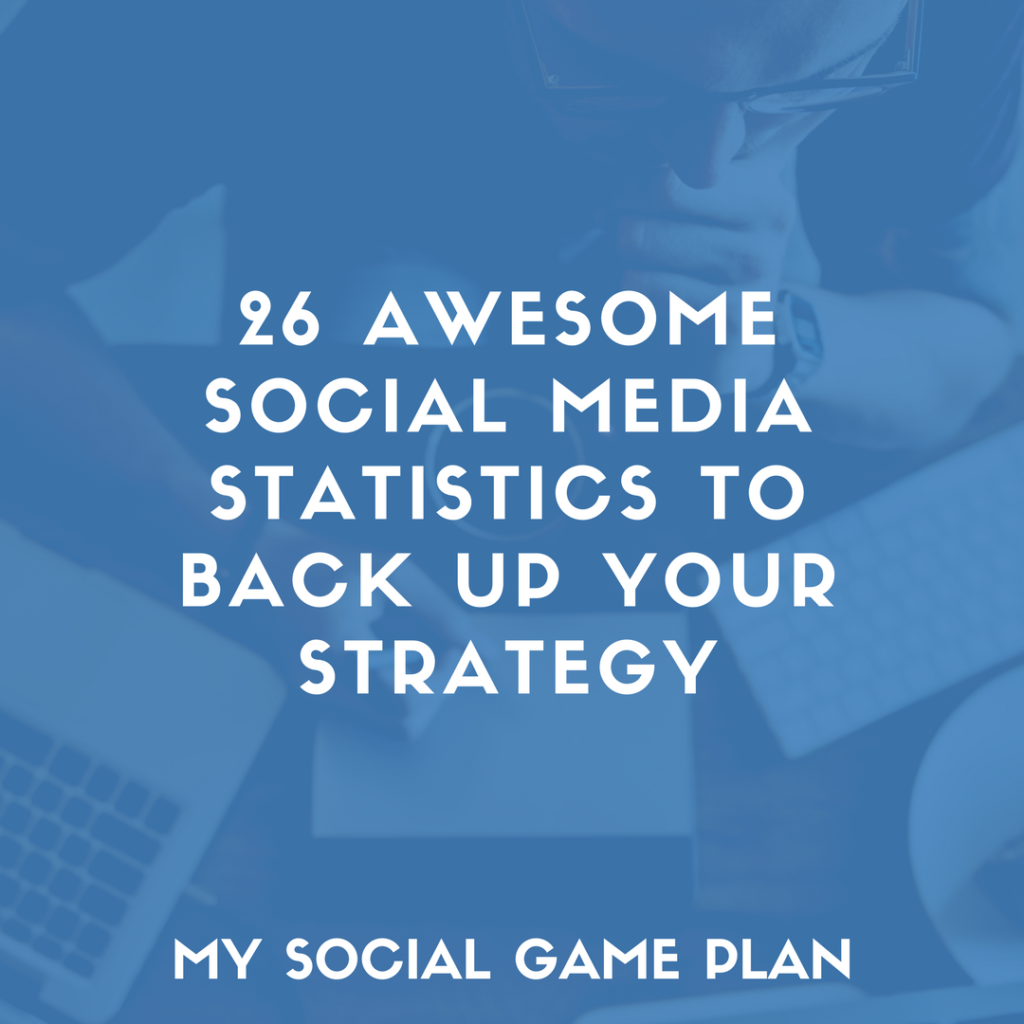Post submitted by Mandy Edwards.
“Social media is not just a spoke on the wheel of marketing. It’s becoming the way entire bicycles are built.” – Ryan Lilly
I came across the above quote and thought it to be a great illustration of how social media is becoming so deeply ingrained in marketing strategies across the board.
Of course, any effective social media strategy is founded in research, analytics, and statistics — consumer behaviors, interests, patterns, demographics, and so on.
Being a fan of data and statistics, I love finding different bits of information among the common data we social media marketing professionals regularly use.
Some bits are eye-opening, some are really odd.
Some make you sit and really evaluate what your actual usage behavior is, while some just make you laugh.
Below are 26 social media marketing statistics I’ve found while doing client research and putting together my weekly Marketing Fact Friday series (you can follow on Instagram) that will help advise your social media strategy.
Social Media Usage
- Generation X (ages 35-49) spends the most time on social media: almost 7 hours per week versus Millennials, who come in second, spending just over 6 hours per week. (Nielsen)
- Almost 80% of time spent on social media platforms happens on mobile. (MarketingLand)
- 81% of millennials check Twitter at least once per day. (Pew Research Center)
- Nearly half (43%) of weekly Facebook activity and a third (33%) of weekly Twitter activity occurred on Sundays. (Nielsen)
- The number of active social media users worldwide is 2.78 billion, out of the world’s population of 7.47 billion. (we are social)
- Smartphones accounted for 78% of adults, ages 18-34, total weekly social minutes. (Nielsen)
- Adults ages 50+ spent 64% more time on social media in 2016 than in 2015. (Nielsen)
- 85% of people rely on Twitter and Facebook for their morning news. (Byte of Data)
Social Media + TV
- There were 11.8 million TV-related interactions on Facebook from 5.9 million people on average each day this fall. (Nielsen)
- On an average day, 42% of those interacting with TV on Facebook are Generation X, 40% are Millennials, and the remaining 18% are Baby Boomers. (Nielsen)
- 81% of engagement with TV-related Tweets comes organically from the audience. (Nielsen)
- 57% of people who used their tablet while watching television said they visited Facebook while doing so, compared with 24% who said they visited Twitter. On smartphones, those numbers were 58% and 20%, respectively. (Nielsen)
Social Media + Business
- More than 2 million advertisers regularly use Facebook to market their business. (Hootsuite)
- While 64 percent of marketers have a Snapchat account, only 67 percent of those accounts are active. (L2)
- 59% of Americans with social media accounts think that customer service through social media has made it easier to get questions answered and issues resolved. (Hootsuite)
- 13% of heavy social media users clicked on an advertisement within the last 30 days. (Nielsen)
- 30% of heavy social media users think it’s very or somewhat important to engage with social media in order to show support of their favorite companies or brands. (Nielsen)
- 93% of Pinterest users use the platform to plan or make purchases. (Pinterest)
Social Media Content
- Tweets with images received 150% more retweets than tweets without images. (HubSpot)
- When people hear information, they’re likely to remember only 10% of that information three days later. However, if a relevant image is paired with that same information, people retained 65% of the information three days later. (Brain Rules)
- 62% of B2B marketers rated videos as an effective content marketing tactic in 2016. (Content Marketing Institute)
- Cisco projects that global internet traffic from videos will make up 80% of all internet traffic by 2019. (Cisco)
- 51% of all video plays are on mobile devices — this growth represents a 15% increase from 2015 and a 203% increase from 2014. (Facebook)
- Cisco projects that global internet traffic from videos will make up 80% of all internet traffic by 2019. (Cisco)
- Videos under five minutes in length account for 55% of total video consumption time on smartphones. (Ooyala)
- 85% of videos on Facebook are watched without sound. (Digiday)
Wrap Up
Some of these statistics you may be able to use for your own business, or for a client. Having data to back up anything you propose or want to do yourself, is always key — it gives you and what you’re proposing more credibility (as long as the data is from a credible source).
What kind of data and statistics are used in your business’ marketing strategy? Share with us below!
____________
About the Author
Mandy Edwards is the founder of ME Marketing Services, a social marketing and website design company located in Statesboro, Georgia. A proud graduate of the Terry College of Business at the University of Georgia, she has 15+ years marketing experience covering sales, event planning, local store marketing, advertising and social media.

Mandy has been mentioned in Forbes and Crain’s Chicago Business, named to the Statesboro Herald’s Top 20 under 40, has been ranked as a Top 100 Social Media Power Influencer by StatSocial and is a Sprout Social All-Star Influencer. In 2016 she was recognized as a member of the University of Georgia’s top 40 Under 40 Alumni.



Speak Your Mind